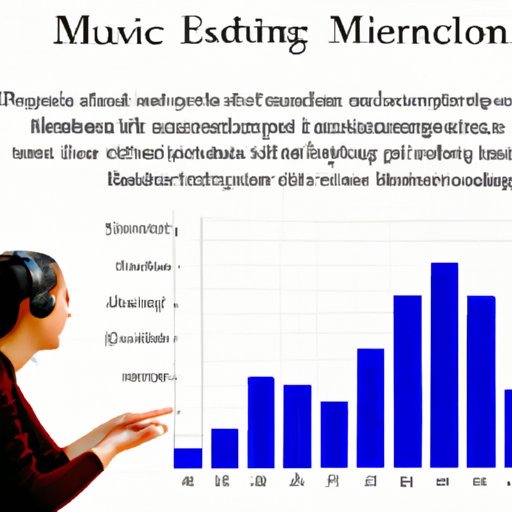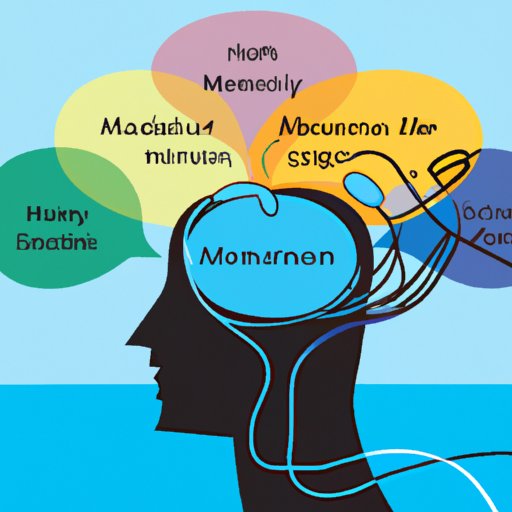Introduction
Mental health is an important factor in overall wellbeing. It refers to our psychological, emotional, and social wellbeing, and can be impacted by various factors in our lives. One factor that has been explored in recent years is the effect of music on mental health. Studies have shown that music can have both positive and negative effects on mental health, depending on the type of music and how it is used.
This article will explore the link between music and mental health, looking at how music can affect our mental wellbeing. We will examine the therapeutic benefits of music, investigate its role in emotion regulation, assess its use in treating stress and anxiety disorders, and analyze its impact on memory and cognitive functioning.
Examining the Link Between Music and Mental Health
Studies have found that music can have a positive impact on mental health. A study published in the journal Frontiers in Psychology found that music can reduce levels of depression, anxiety, and stress, while simultaneously increasing feelings of pleasure and relaxation. Other studies have found that music can improve mood, reduce fatigue, and help with social interaction.
The benefits of listening to music are not just limited to mental health. Research has also shown that music can have positive physical effects, such as reducing blood pressure and heart rate. It can also help with pain management and improve sleep quality.

Exploring the Therapeutic Benefits of Music
Music can be used as an outlet for expression. It can provide an opportunity to express emotions that may be difficult to put into words. Listening to or creating music can be a powerful way to process and work through difficult feelings.
Music can also be used as a tool for relaxation. Listening to calming music can help to reduce stress and anxiety levels, while upbeat music can increase energy levels and motivate us to take action. Studies have found that even short periods of listening to relaxing music can significantly reduce stress levels.
Finally, music can be a source of comfort. It can provide solace in times of distress, allowing us to connect to a deeper part of ourselves. Listening to familiar songs can evoke powerful memories and feelings, helping us to feel connected to our past and present experiences.

Investigating the Impact of Music on Emotional Regulation
Music can also have a significant impact on our emotional state. Studies have found that listening to music can influence our mood, either positively or negatively. Upbeat music can put us in a good mood, while slower, more melancholic music can make us feel sad. Research has also found that certain types of music can reduce levels of anger, fear, and anxiety.
Music can also have an effect on our stress levels. Listening to calming music can help to lower levels of cortisol, a hormone that is released during times of stress. This can help to reduce feelings of tension and overwhelm, allowing us to focus more clearly on the task at hand.
Analyzing the Role of Music in Treating Stress and Anxiety Disorders
Music therapy is a form of treatment that uses music to address physical, emotional, cognitive, and social needs. Music therapists use music to help their clients express themselves, regulate their emotions, manage stress, and improve communication. Studies have found that music therapy can be effective in treating stress and anxiety disorders, such as post-traumatic stress disorder (PTSD) and generalized anxiety disorder (GAD).
Music therapy can also be used to treat depression. Research has found that listening to music, playing an instrument, or engaging in other musical activities can help to reduce symptoms of depression. Music therapy programs can also be used to help build self-esteem and improve interpersonal skills.
Discussing the Use of Music as a Coping Mechanism
Music can also be used as a coping mechanism. Listening to music can provide an escape from difficult emotions and stressful situations. It can also be a form of self-expression, allowing us to express our feelings in a safe and non-judgmental way.
Different types of music can be used as coping strategies. Calming music can help to reduce stress and anxiety levels, while upbeat music can help to boost energy levels and motivate us to take action. Instrumental music can also be used to help clear the mind and focus on the present moment.

Looking at the Relationship Between Music and Memory
Music also plays a role in memory. Studies have shown that listening to music can improve memory retention, particularly for those who are struggling with memory loss due to age or illness. Music can also help to improve recall, allowing us to remember information more easily.
Music can also be used to enhance memory formation. Listening to upbeat music can help to increase alertness and focus, making it easier to take in new information. Research has also found that music can help to improve creative thinking, allowing us to come up with innovative solutions to problems.

Assessing the Effects of Music on Cognitive Functioning
Finally, research has found that music can have a positive impact on cognitive functioning. Studies have shown that listening to music can improve attention and concentration, allowing us to focus on tasks for longer periods of time. Music can also help to reduce levels of distractibility and improve problem-solving skills.
Music can also help to sharpen our minds. Studies have found that listening to classical music can help to improve abstract reasoning and spatial intelligence, while listening to jazz can help to improve divergent thinking abilities.
Conclusion
In conclusion, this article has explored the link between music and mental health. We have seen that music can have a positive impact on mental wellbeing, providing benefits such as relaxation, comfort, mood regulation, and improved cognitive functioning. We have also looked at how music can be used as a form of therapy, a coping strategy, and a tool for enhancing memory and cognitive functioning.
These findings suggest that music can be an effective tool for managing stress and improving mental health. Further research is needed to better understand the effects of music on mental health, and to determine which types of music are most beneficial for different individuals.
(Note: Is this article not meeting your expectations? Do you have knowledge or insights to share? Unlock new opportunities and expand your reach by joining our authors team. Click Registration to join us and share your expertise with our readers.)
